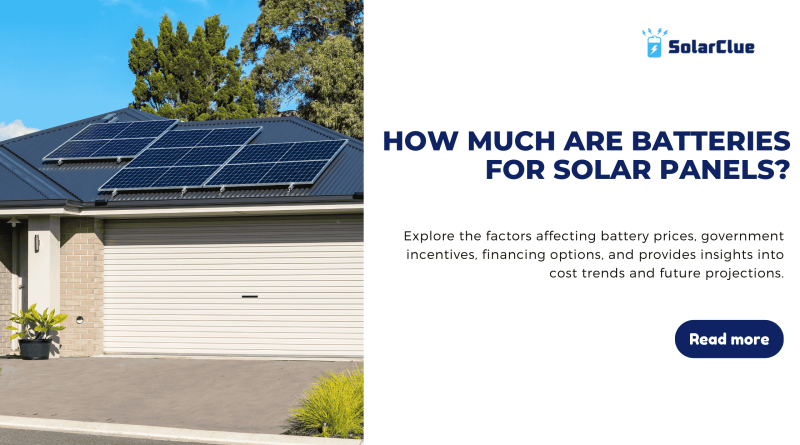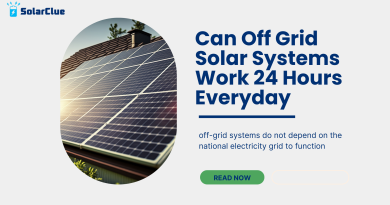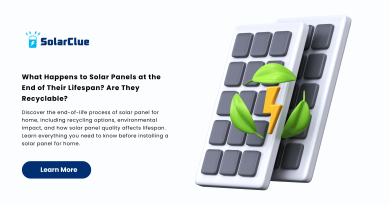How Much Are Batteries For Solar Panels?
As more homeowners and businesses turn to solar energy, understanding the cost of solar batteries is crucial for optimizing energy storage and maximizing the benefits of a solar system. This guide breaks down the factors affecting battery prices, explores government incentives, financing options, and provides insights into cost trends and future projections.
Table of Contents
- 1 Breaking Down the Cost of a Solar Battery System
- 1.1 Impact of Battery Type on Price
- 1.2 Factors Affecting Battery Capacity and Cost
- 1.3 Government Incentives and Rebates for Battery Storage
- 1.4 Financing Options for Solar Battery Purchases
- 1.5 Estimating Payback Period and Return on Investment
- 1.6 Tips for Getting the Best Price on Solar Batteries
- 1.7 Cost Trends in the Battery Market and Future Projections
- 1.8 The Impact of Battery Technology Advancements on Price
- 1.9 Comparing Battery Costs to Other Energy Storage Solutions
- 1.10 Comparison of Solar Battery Types and Costs
- 1.11 Conclusion
- 1.12 FAQs
Breaking Down the Cost of a Solar Battery System
The cost of a solar battery system is influenced by several components:
- Battery Cost: The price of the battery itself, which varies depending on the type, capacity, and brand.
- Inverter Upgrades: A compatible inverter may be required to connect the battery to the solar system, adding to the overall cost.
- Installation Costs: Professional installation is necessary to ensure the system is set up correctly and safely.
- Additional Components: This may include battery management systems, cabling, and monitoring systems.
Impact of Battery Type on Price
Different types of batteries come with varying costs and performance characteristics:
- Lead-Acid Batteries: Traditionally the most common type, lead-acid batteries are relatively inexpensive but have a shorter lifespan and lower efficiency compared to newer technologies.
- Lithium-Ion Batteries: These are more expensive but offer longer lifespans, higher efficiency, and better performance, making them the preferred choice for modern solar systems.
- Flow Batteries: A newer technology with a longer lifespan and deeper discharge capability, but they are generally more expensive and less common in residential settings.
Factors Affecting Battery Capacity and Cost
Battery capacity, measured in kilowatt-hours (kWh), is a key factor in determining cost:
- Energy Storage Needs: Larger capacities are needed for homes with higher energy consumption or those looking to achieve greater energy independence.
- Depth of Discharge (DoD): Higher DoD allows for more usable capacity, often leading to a higher cost.
- Cycle Life: The number of charge/discharge cycles a battery can handle before its capacity degrades also impacts cost; higher cycle life typically increases the price.
Government Incentives and Rebates for Battery Storage
Many governments offer incentives and rebates to reduce the cost of solar batteries:
- Federal Tax Credits: In some countries, solar battery installations may qualify for federal tax credits, which can significantly reduce upfront costs.
- State and Local Incentives: Various states and municipalities offer additional rebates and incentives for battery storage, further lowering the overall expense.
- Utility Rebates: Some utility companies provide rebates or incentives for customers who install battery storage systems, especially in regions with peak demand issues.
Financing Options for Solar Battery Purchases
Several financing options can make solar batteries more affordable:
- Solar Loans: Many financial institutions offer loans specifically for solar systems, including battery storage, allowing for manageable monthly payments.
- Leasing Options: Some companies offer battery leasing, where homeowners can rent a battery system for a fixed monthly fee, avoiding large upfront costs.
- Power Purchase Agreements (PPAs): In some cases, homeowners can enter into a PPA, where they pay for the energy stored in the battery rather than the battery itself.
Estimating Payback Period and Return on Investment
The payback period and ROI of a solar battery system depend on several factors:
- Energy Savings: Calculate how much you’ll save on electricity bills by using stored solar energy instead of grid power.
- Incentives and Rebates: Factor in any government incentives or rebates that reduce the initial investment.
- Electricity Rates: In regions with high electricity costs or time-of-use pricing, the payback period may be shorter due to higher savings.
Tips for Getting the Best Price on Solar Batteries
To ensure you get the best value for your investment:
- Compare Quotes: Obtain quotes from multiple suppliers to compare prices and warranties.
- Consider Total Cost of Ownership: Look beyond the upfront cost and consider the total cost of ownership, including maintenance, lifespan, and efficiency.
- Check for Bulk Discounts: Some suppliers offer discounts for purchasing multiple batteries or as part of a larger solar installation package.
Cost Trends in the Battery Market and Future Projections
The cost of solar batteries has been decreasing due to technological advancements and increased demand:
- Decreasing Costs: The price of lithium-ion batteries, in particular, has dropped significantly in recent years, making them more accessible.
- Future Projections: Continued advancements in battery technology and economies of scale are expected to drive prices down further, making solar batteries even more affordable in the future.
- Emerging Technologies: New battery technologies, such as solid-state and flow batteries, may offer improved performance at lower costs in the coming years.
The Impact of Battery Technology Advancements on Price
Technological advancements are key to reducing the cost of solar batteries:
- Improved Efficiency: Advances in battery chemistry and design are leading to more efficient batteries with higher energy density, reducing costs per kWh.
- Longer Lifespans: Newer batteries are designed to last longer, reducing the need for replacements and lowering long-term costs.
- Scalability: As production scales up, manufacturing costs decrease, leading to lower prices for consumers.
Comparing Battery Costs to Other Energy Storage Solutions
While solar batteries are popular, other energy storage solutions may also be considered:
- Thermal Storage: This involves storing heat energy, which can be less expensive but is typically less flexible than battery storage.
- Hydrogen Storage: Hydrogen can be used to store excess energy, though this technology is still in its early stages and currently more costly than batteries.
- Grid Storage: In some cases, connecting to a grid storage system may be an alternative, though it depends on local infrastructure and regulations.
Comparison of Solar Battery Types and Costs
| Battery Type | Average Cost (per kWh) | Lifespan | Efficiency | Depth of Discharge (DoD) |
|---|---|---|---|---|
| Lead-Acid | ₹8,000 – ₹10,000 | 3-5 years | 70-85% | 50-70% |
| Lithium-Ion | ₹12,000 – ₹15,000 | 10-15 years | 90-95% | 80-90% |
| Flow Batteries | ₹18,000 – ₹22,000 | 15-20 years | 70-80% | 100% |
| Solid-State (Emerging) | ₹20,000+ | 10-20 years | 95-99% | 90-100% |
Conclusion
Understanding the cost of solar batteries is essential for anyone looking to invest in solar energy storage. By considering factors like battery type, capacity, and installation costs, and taking advantage of government incentives and financing options, you can make an informed decision that maximizes both savings and environmental benefits. As technology continues to advance and costs decrease, solar batteries are becoming an increasingly attractive option for energy independence and sustainability.
Here at SolarClue®, we offer a smart, practical, and “beautiful” solution. You will be answered for all the questions related to Solar.
We provide all kinds of brands that are the Best Solar panels in India.
If you are the one who is planning for the solar power system. Don’t hesitate to contact our team!
Looking forward to empowering you with solar energy, just like hundreds of our other clients!
FAQs
Q1: How much does a solar battery system typically cost?
A: The cost of a solar battery system varies depending on the battery type, capacity, and installation requirements. On average, a residential system can range from ₹1,00,000 to ₹5,00,000.
Q2: Are there any government incentives for solar batteries?
A: Yes, many governments offer tax credits, rebates, and incentives to reduce the cost of solar battery systems. These incentives vary by location, so check with local authorities.
Q3: What is the difference between battery cost and total system cost?
A: The battery cost is the price of the battery itself, while the total system cost includes installation, inverter upgrades, and additional components like monitoring systems.
Q4: How long do solar batteries last?
A: Solar batteries typically last between 5 to 15 years, depending on the type and usage. Lithium-ion batteries generally have a longer lifespan compared to lead-acid batteries.
Q5: Can I finance my solar battery purchase?
A: Yes, there are various financing options available, including solar loans, leasing, and power purchase agreements (PPAs), which can help spread the cost over time.




